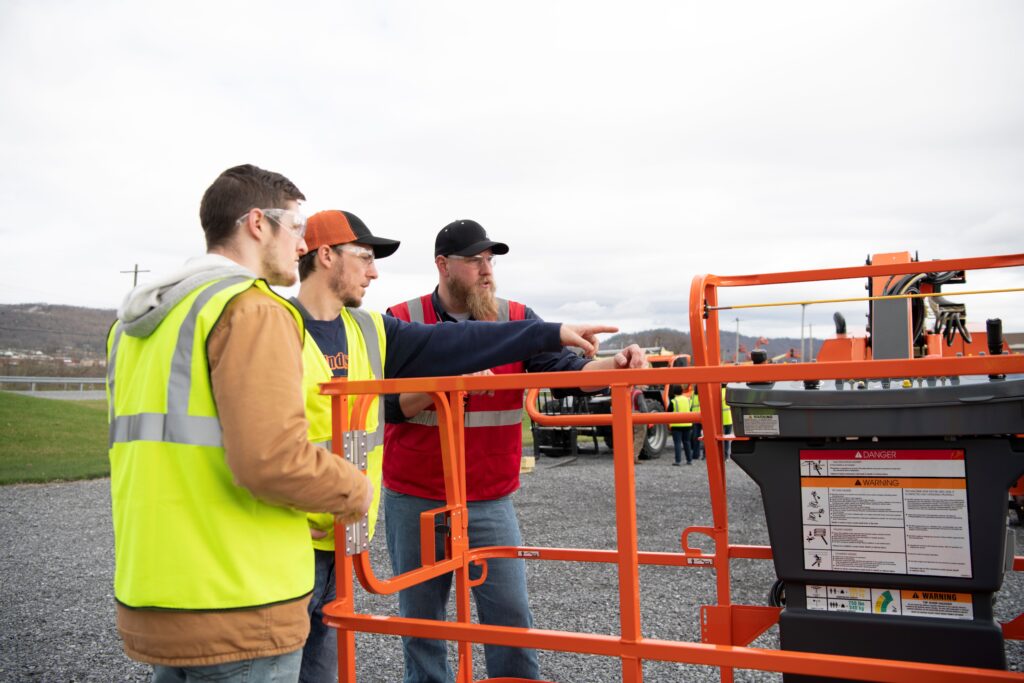In the world of elevating platforms, understanding the distinction between familiarization and training is crucial for both operators and businesses. Mobile elevating platforms, such as the aerial work platforms, scissors, booms and mast lifts, are of great help in various industries, including construction, maintenance, and logistics.
Operating these machines and doing it in a safe way requires sharing knowledge, from norms to best practices. Providing training and familiarization about it is the best way to do it.

Training
Training is often the first step in introducing an operator to mobile elevating platforms because it is normally a generic introduction to general rules for operators of mobile elevating platforms. In most cases, training is done in person (although nowadays there are some online trainings), and might take one or several days to complete. Historically, because of the complexity, the operator training can be split by machine types. Some operators will be trained to operate some types or all of them, depending on the training they require.
Training typically includes:
1. Theory and Regulations: Detailed understanding of safety regulations, standards, and compliance requirements relevant to elevating platforms.
2. Operation Techniques: In-depth training on operating the equipment, including handling different conditions and challenges.
3. Emergency Procedures: training on responding to emergencies, troubleshooting, and handling unexpected situations.
4. Maintenance: Some training programs cover basic maintenance tasks to ensure operators can identify and address minor issues.
Familiarization
Familiarization, additionally, will provide the specific details to operate a particular unit or group of units. A familiarization will usually refer to a particular kind of machine, from a specific brand, belonging to one of the machine types. Familiarization is usually a logical follow-up after the operator received a training and got introduced to the industry rules and requirements; it is also a part of the training an operator must receive to be considered competent.
Familiarization provides more detailed information about the specific equipment, its controls, and safety features; it can be done informally, often by a co-worker or supervisor who may have experience with the equipment. Depending on the type of mobile elevating platform, familiarization does not always require personal presence of the operator and can be done online.
The familiarization process typically includes:
1. Introduction to the Equipment: Operators are shown the machine, its components, and how to perform basic tasks like starting, stopping, and moving the platform.
2. Safety Features: Familiarization emphasizes safety, highlighting critical features like emergency stops, fall protection, and operational guidelines.
3. Practical Experience: Familiarization might involve some hands-on experience to help operators get comfortable with the equipment.
The Impact on the Market
On the modern market, both familiarization and training are highly important due to the following reasons.
1. Safety: Trained operators are less likely to cause accidents or damage the equipment, which is a significant concern in the elevating platforms market.
2. Market Demand: As safety regulations become stricter, there is an increasing demand for trained operators.
3. Efficiency: Trained operators are more efficient and productive, leading to cost savings and enhanced market competitiveness.
Conclusion
As the mobile elevating platforms market evolves, training is becoming an indispensable aspect of the industry, driving safety and efficiency in many industries. At Power Towers, we are providing familiarization for each of our machines. For more information visit Training Programs Through JLG | JLG.
If you’re unsure what is the best choice for you, training or familiarization, contact our customer support team, and they will provide you with some advice: Customer Support – Power Towers.

